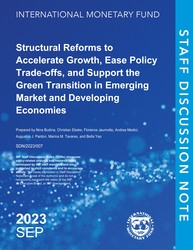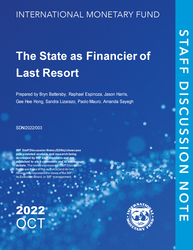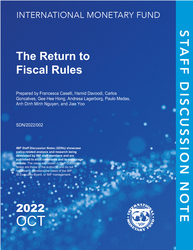
Structural Reforms to Accelerate Growth, Ease Policy Trade-offs, and Support the Green Transition in Emerging Market and Developing Economies
Structural Reforms to Accelerate Growth, Ease Policy Trade-offs, and Support the Green Transition in Emerging Market and Developing Economies
READ MORE...
Volume/Issue:
Volume 2023
Issue 007
Publication date: September 2023
ISBN: 9798400250095
$20.00
Add to Cart by clicking price of the language and format you'd like to purchase
Available Languages and Formats
| English |
Prices in red indicate formats that are not yet available but are forthcoming.
Topics covered in this book
This title contains information about the following subjects.
Click on a subject if you would like to see other titles with the same subjects.
Finance , Economics- Macroeconomics , Economics / General , Environmental Conservation and Protection , Public Policy- Environmental Policy , policy trade-off , climate policy stringency , policy space , policy action , developing economy , Emerging and frontier financial markets , Structural reforms , Climate policy , Greenhouse gas emissions , Global , Caribbean
Summary
In the aftermath of the COVID-19 pandemic, emerging market and developing economies are grappling with economic scarring, social tension, and reduced policy space. Policy actions are already urgently needed to boost growth in the near term and support the ongoing green transition. At the same time, high public debt and persistently high inflation have constrained policy space, posing difficult policy trade-offs. This Staff Discussion Note focuses on emerging market and developing economies and proposes a framework for prioritization, packaging, and sequencing of macrostructural reforms to accelerate growth, alleviate policy trade-offs, and support the green transition. The note shows that prioritizing the removal of the most binding constraints on economic activity, bundling reforms (governance, business deregulation, and external sector reforms), and appropriate sequencing of other reforms (such as labor market and credit sector reforms) can help front-load reform gains. In emerging market and developing economies with large initial structural gaps, the estimated output effects of such a major reform package are sizable—about 4 percent in two years and 8 percent in four years. Achieving higher growth and lower absolute carbon emissions over time requires a well-designed strategy that includes both macrostructural and green reforms.
Copyright © 2010 - 2026
Powered by:
AIDC



